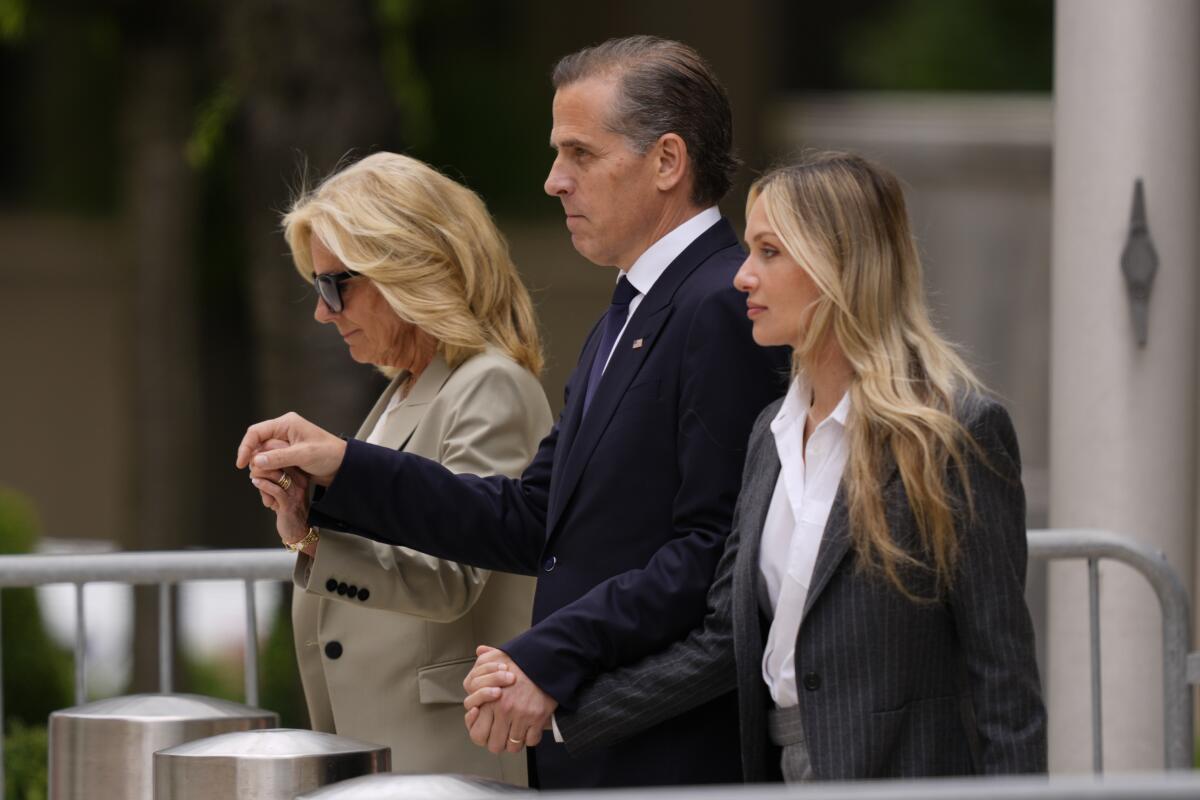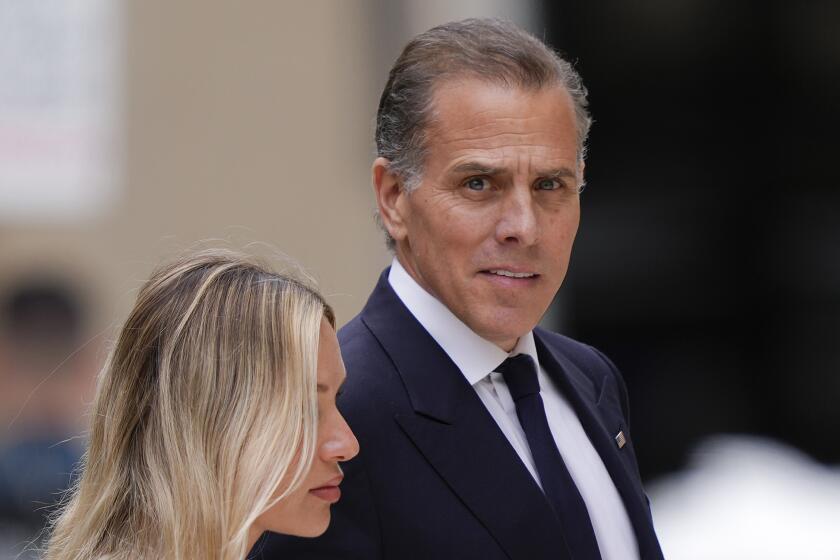Editorial: Of course politics influence the justice system. That doesn’t mean Trump, Biden verdicts were rigged

- Share via
Americans of a particular ideological bent would have you believe that Donald Trump’s prosecution and conviction for falsifying business records to hide hush money payments to Stormy Daniels and protect his 2016 presidential candidacy were engineered by the Biden White House, which has “rigged” the entire justice system to benefit the current president. Except, of course, for the conviction of Hunter Biden, which was proper retribution dished out by an honest and independent court of law.
At the other end of the political spectrum, partisans may insist that while President Biden’s son technically broke the law when he lied on a form in order to buy a gun while addicted to cocaine, he was a victim of a prosecutor and court bending too far backward to pretend they were free of partisan politics.
President Biden’s son was singled out for an unusual indictment by special counsel David Weiss, a former U.S. attorney under Donald Trump.
It’s a real-life version of an old maxim: Every court ruling leaves one party with reinvigorated confidence in our justice system and the other one convinced that judges and juries are all incompetent, on the take or out to get them.
Another outlook might be that on balance, courts operate independent of the political world.
But that’s not quite right, either. Although any competent justice system does its best to mete out criminal punishment or exoneration free from political trends, popularity or personal interest, politics is intimately involved in shaping the criminal justice system.
Most state judges and local prosecutors must campaign for election. Federal judges are recommended by political cronies, appointed by the president and approved or rejected by a decidedly partisan Senate, as are federal prosecutors.
Supreme Court justices’ questions during oral argument on Donald Trump’s claim that he is immune from criminal acts indicate that they see that giving dictator-like powers to U.S. presidents is dangerous.
It is futile to pretend that judges are free of political views or connections, or that political interests and popular opinion have no role in the outcome of cases. Clarence Thomas is not the first Supreme Court justice to accept free gifts from acquaintances with pecuniary or ideological interests at stake. Samuel A. Alito Jr. is not the first to publicly display his political leanings or prejudices.
Even the ancient myths that form the literary and philosophical foundation of our justice system acknowledge some degree of political interference from the beginning.
The dramatist Aeschylus and other ancient Greek writers recounted what their tradition said was the first-ever trial, concerning Orestes’ murder of his own mother. Was the son to be eternally punished for the horrid act? Or excused because his mother had killed his father, leaving Orestes duty-bound under the old system of blood feud and endless retaliation (and besides, ordered by the god Apollo) to slay her in revenge? Athena appoints the first jury — 12 members, of course — but they split.
The far-right Supreme Court majority has bigger accountability problems than Samuel Alito and Clarence Thomas.
Orestes prevails when Athena casts her own vote for him — as probably had been her plan from the beginning. The mythical first trial may have been rigged.
So do we despair of the possibility of evenhanded justice and see each courtroom as merely one more arena for rule by the mightiest, the richest, the most well-connected or the most popular?
No. Politics necessarily has a role in the justice system, but the American system is countered and contained, not by Greek gods and goddesses but by a complex of essential procedures and rituals. We have detailed rules for juries — summonses, voir dire, instructions, deliberations — and rules of evidence, witness testimony, public and press observers, appeals, pardons.
Witnesses place their hands on the Bible and swear to tell the truth. Still, courts are human institutions run by flawed human beings who have only each other, and the law, to keep them as honest and fair as possible.
It shouldn’t take a criminal conviction to convince conscientious voters of Trump’s epic unfitness. But those who support him must now reckon with the fact that their candidate is a convicted felon.
Trump’s claim of a “two-tiered” justice system is laughable only because of his absurd implication that as a coddled, rich and privileged man he’s in the bottom of those tiers. In fact, our system still separates criminal defendants by wealth, setting free those (like Trump) who can bail out and locking up those who can’t.
Despite laws prohibiting racial discrimination, prosecutors still block jurors by race, religion or other attributes to gain a strategic edge. The Supreme Court still operates without any serious check on individual members’ ethical lapses. The justice system still is more likely to ensnare a Black defendant than a white one for the same offense and more likely to convict and more severely punish the Black ones.
Our task should be to continue, step by step, to expunge politics from the justice system, despite knowing that the job will never be truly complete. And to defend against attempts by Trump and others to inject more politics into the system, by calling convicted and imprisoned offenders “hostages,” dangling pardons for his supporters, insisting on immunity for presidential acts (by him, of course, not by Biden) and framing any ruling against him as the product of a rigged system that only he can unrig.
More to Read
A cure for the common opinion
Get thought-provoking perspectives with our weekly newsletter.
You may occasionally receive promotional content from the Los Angeles Times.














